
She belonged to all of us…
Warrior
Teacher
Scholar
Traveler
Mother
“I saved the whales and passed the black-eyed peas.
“I hung the moon and aired the laundry in public.
“I've had transcendent moments of ecstasy - both physical and psychological, and I've seen the bottom of the deepest pit of Dukkha's debilitating despair. I have friends who are shinning beacons of love-light and bring wonderment and joy to my life, and others who walked away in the moment I needed them most. I've felt my heart grow to the size of the universe, filled with unqualified and totalizing love. I've felt completely alone and lost in a very crowded world. All these dichotomies and I'm still in one piece of loosely bound subatomic particles. Wherever I've been and the things I have done, finding and spreading light along the way, it's a long road from Abilene, 1952 through Kabul in September 1970, on to India forever.”
ॐ श्री रामYvette Claire “RamRani” Rosser was a non-violent civil rights activist and scholar of South Asian studies.
Her love affair with travel sparked in 1970 at the age of 18. It was first set alight with family in Europe, then eventually in trekking overland to India, where she took part in the spiritual and psychedelic renaissance that marked the decade. She found her people in 1973: Neem Karoli Baba and a group of his followers at Vrindavan. She accepted a mission to venture onward raising awareness, respect, and understanding for Hindu dharma.
+ + + + + + + + + +
“Hinduism” was actually a term coined by the British (yay colonialism! 🤮) as a blanket for the indigenous spiritual practices of the people of the Indian subcontinent. To those people, it is the eternal law of Sanatan Dharma, a fundamental belief that everyone and everything everywhere is God; that the source of personal divinity is the same source of divinity inherent in all of creation.
Despite its peaceful and sacred outlook, Hinduism is commonly viewed throughout the world as barbaric, savage, or uncivilized. These Xenophobic misconceptions known as Hinduphobia, have contributed to generations of violence and civil unrest amongst the global Hindu community and multidenominational population of India, still to this day demonizing a culture and spiritual practice that for many, is the very foundation of their history, identity, and home.
She was born Yvette Claire Rosser on January 31, 1952 into a comfortable, middle-class home in Abilene, TX. The second of three daughters to Felix Hoyt Rosser, a Texan businessman and WWII war hero, and Dr. Janine Smets Randal, originally from Belgium, professor of French, German and Philosophy. She grew up a tom-boy, the one among her sisters who looked the most like their father. Perhaps for that very reason, she bore the brunt of his abuse, forming an innate sense of justice from a young age.
Only two years older than Ruby Bridges, growing up in white, upper middle-class West-Texas, Yvette argued frequently with her right-wing father as she watched the civil rights movement unfold before her eyes. A passionate dissent for oppression and discrimination marked the beginning of her development into a staunch nonviolence and civil rights activist.
Felix wanted none of it. He sent her off to Catholic reform school as a freshman in 1967, where a progressive young English teacher named Gloria Gannaway took her under her wing, perceiving Yvette’s parents to be ill-equipped for such a “rebel child” during the height of the counterculture movement.
Even though segregation was “officially” over in American public schools, Yvette’s school spoke openly about the government forcing integration, still penalizing the open association of black and white school children. Yvette refused to be discreet about her friendships with black classmates, and was eventually expelled for bringing a black boy as her date to the winter dance.
She was gifted a trip to Belgium for her high school graduation. After visiting family, she ventured on to explore the world around her. Overland travels took her along her own Hippie Trail, through Italy, Turkey, Afghanistan, and into India where she found her home, her community, and realized her core beliefs were deeply enmeshed with her life’s greatest purpose.
Her views on civil rights and social justice came from a place of love; from understanding that no matter the color of our skin, we all bleed red. She was acutely aware of the pain of others, and through this awareness was drawn to Buddhist philosophy and Dharmic religion through her early travels, awakening an untapped curiosity for a spiritual connection that had been brewing for years.
She was defined by her spirituality just as much as her revolutionary ideals. Gurus were not middlemen to God and never required for a relationship with the Divine; merely teachers holding up mirrors, guiding to your own divinity. Yvette often spoke of recurring dreams from her childhood, clothed in red robes on the steps of a temple, raped and murdered by Chinese Maoists. She would awaken from these dreams with odd feelings of bliss and light. She recognized the red robes from her dreams on the shoulders of the Tibetan monks and nuns during her first visit to Dharamshala. In 1971, Yvette asked her first Guru, the Dalai Lama if he believed her to be a reincarnated Tibetan Buddhist nun. He didn’t really answer her but looked at her with a bright smile spread across his kind face.
Her first years in India and Nepal ‘71-’73 were spent studying Tibetan Buddhism.
Always advocating for the humanity in others, she was drawn like a magnet to the ideas of universal oneness, and her travels through India only solidified those views. She started studying Sanskrit and Hindu Philosophy in early 1973 when she was given the name RamRani by Maharaj-ji Neem Karoli Baba. RamRani never wavered in her fierce devotion to Neem Karoli Baba’s mission. It was during her post grad studies in 1993 that she first encountered the colonial perspectives of Hinduism in its history. Realizing how this was contributing actively to the rise of Hinduphobia worldwide, she began working to change them.
RamRani‘s work as a scholar was largely centered around correcting how Hinduism and India’s history were portrayed in Western textbooks. Accurate representation in textbooks in particular is important, as this is how most students learn about other cultures and people.
As a mother, RamRani was bigger than life. She was a devoted caregiver and instilled her love of writing and literature in her children. She allowed no intellectual laziness in her house, encouraging travel and adventure, and just plain fun. As a child, she hated being told, ‘because I said so’ by the adults in her life. Instead, she urged her children to further their agendas by exercising their minds and fostering skills of negotiation. Answers were still often no, but RamRani always preferred to entertain a lively discussion over shutting things down with authority. She raised her daughter and sons to be active citizens. Voting was the minimum; activism and participation held just as much importance, if not more.
RamRani fostered kindness. Determined to deliver to her children a different experience from her own, ahimsa was the baseline of her parenting philosophy. RamRani was not perfect. Her relationships with her children were far from ideal, but she was as committed to raising her kids to be good, kind, aware people as she was to her own academic legacy and Maharaj-ji’s vision.
She dedicated her life to realizing and teaching the oneness among us. Same, same but different. She instilled it in her children, just as she did for everyone she met throughout the world.

Thank you Maharaj-ji
“Neem Karoli Baba (1900-1973) was a Hindu guru, siddhi yogi, and mystic who believed that service to others was the highest form of devotion to God. Also known to his followers as Maharaj-ji, he was a devotee of Hanuman, the monkey god, who himself is a symbol of devoted service. Having practiced Bhakti yoga most of his life, Neem Karoli Baba's legacy includes the Neem Karoli Baba Ashram in Taos, New Mexico [and Kainchi Dham in Uttarakhand, India where RamRani finally settled and lived on and off for over 50 years]. Well-known people influenced by Neem Karoli Baba and his disciples include Apple founder, Steve Jobs; actress, Julia Roberts; and Facebook founder, Mark Zuckerberg. Philanthropist and eradicator of Smallpox, Dr. Larry Brilliant founded the Seva Foundation, an international organization based in California [that] continues Maharah-ji's legacy of service to others by preventing blindness and restoring sight. [Perhaps his most famous devotee, Ram Dass founded] the Love Serve Remember Foundation to continue Neem Karoli Baba’s [wisdom and spiritual] teachings.”
Summarized for the Western skeptic by Yogapedia
If you would like to know more about Maharaj-ji Neem Karoli Baba, we invite you to watch Japna Tulsi’s film, Windfall of Grace.








